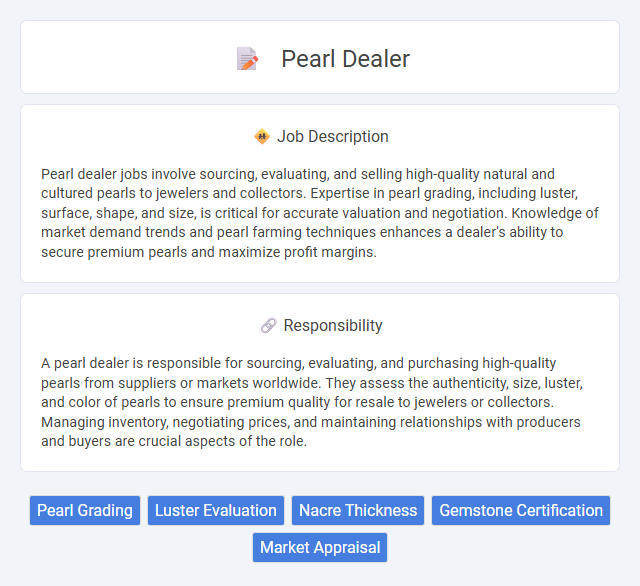
Pearl dealer jobs involve sourcing, evaluating, and selling high-quality natural and cultured pearls to jewelers and collectors. Expertise in pearl grading, including luster, surface, shape, and size, is critical for accurate valuation and negotiation. Knowledge of market demand trends and pearl farming techniques enhances a dealer's ability to secure premium pearls and maximize profit margins.
Pearl dealer jobs may be suitable for individuals with strong attention to detail and an interest in gemstones or luxury goods, as these skills increase the probability of success in assessing pearl quality and negotiating prices. People who thrive in high-pressure sales environments and possess good communication abilities are more likely to find this work rewarding. However, those who prefer routine or low-stress jobs might struggle due to the competitive and sometimes uncertain nature of the pearl market.
Qualification
A pearl dealer must possess in-depth knowledge of pearl types, quality grading, and market valuation to accurately assess and trade pearls. Expertise in gemology certifications, such as GIA or IGI, enhances credibility and ensures proficiency in identifying authentic and high-quality pearls. Strong negotiation skills and a comprehensive understanding of pearl sourcing and supply chains are essential for securing competitive deals and maintaining industry connections.
Responsibility
A pearl dealer is responsible for sourcing, evaluating, and purchasing high-quality pearls from suppliers or markets worldwide. They assess the authenticity, size, luster, and color of pearls to ensure premium quality for resale to jewelers or collectors. Managing inventory, negotiating prices, and maintaining relationships with producers and buyers are crucial aspects of the role.
Benefit
Working as a pearl dealer likely offers opportunities for significant financial gain due to the high value of pearls in the luxury market. The role probably involves building relationships with collectors and jewelers, which can enhance networking and business opportunities. Access to rare and unique pearls may also provide a competitive edge and increase potential profit margins.
Challenge
A pearl dealer's job likely involves navigating the challenge of assessing pearl quality amid varying grades and market standards, which can significantly impact pricing and profitability. There is probable difficulty in verifying pearl authenticity and origin due to the prevalence of cultured or synthetic alternatives. Maintaining strong relationships with suppliers and customers while staying updated on fluctuating market trends may also pose ongoing challenges.
Career Advancement
A pearl dealer career offers significant opportunities for advancement through expertise in gemology, market trends, and client relations. Mastering valuation techniques and establishing a reliable network within the luxury goods sector can lead to roles in high-end retail management or international trade. Continuous education and certification in gemstones enhance credibility, opening pathways to executive positions and entrepreneurship in the pearl and jewelry industry.
Key Terms
Pearl Grading
Pearl grading involves assessing the quality of pearls based on factors such as luster, surface quality, shape, color, and size to determine their market value. A skilled pearl dealer must understand the intricacies of natural versus cultured pearls and identify treatments or enhancements that impact authenticity. Expertise in grading enables accurate pricing, ensuring profitable trading in both wholesale and retail pearl markets.
Luster Evaluation
Pearl dealers specialize in assessing the quality and value of pearls, with luster evaluation being a critical skill in their expertise. Luster refers to the pearl's surface shine and reflectivity, which directly impacts its market value and desirability. Accurate luster assessment involves examining the pearl's surface clarity, reflectiveness, and the sharpness of reflected images, ensuring precise grading for buyers and sellers.
Nacre Thickness
Pearl dealers specialize in evaluating and trading pearls based on key quality factors, with nacre thickness being one of the most important. Thicker nacre layers contribute to the pearl's luster, durability, and value, directly impacting pricing and market demand. Accurate assessment of nacre thickness requires expertise in advanced measurement techniques and knowledge of different pearl varieties.
Gemstone Certification
A pearl dealer specializing in gemstone certification ensures the authenticity and quality of pearls by using advanced gemological tools and standardized grading systems. Accurate certification involves assessing factors such as luster, surface quality, size, shape, and nacre thickness to provide reliable documentation for buyers and sellers. Verified certifications from recognized laboratories enhance market value and build trust in the global pearl trade sector.
Market Appraisal
A pearl dealer specializing in market appraisal evaluates pearls based on size, luster, surface quality, and color to determine their current market value. Expertise in grading natural versus cultured pearls and tracking international pearl market trends allows accurate pricing and inventory decisions. Skilled appraisal ensures optimal buying, selling, and trading strategies within competitive luxury jewelry sectors.
 kuljobs.com
kuljobs.com